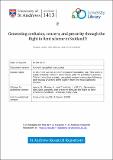Files in this item
Generating confusion, concern, and precarity through the Right to Rent scheme in Scotland
Item metadata
| dc.contributor.author | Leahy, Sharon | |
| dc.contributor.author | McKee, Kim | |
| dc.contributor.author | Crawford, Joe | |
| dc.date.accessioned | 2019-11-28T00:36:43Z | |
| dc.date.available | 2019-11-28T00:36:43Z | |
| dc.date.issued | 2018-06 | |
| dc.identifier | 250951730 | |
| dc.identifier | 7f0d5850-ebbe-41d2-832f-b0d9be920353 | |
| dc.identifier | 85046095608 | |
| dc.identifier | 000431488300002 | |
| dc.identifier.citation | Leahy , S , McKee , K & Crawford , J 2018 , ' Generating confusion, concern, and precarity through the Right to Rent scheme in Scotland ' , Antipode , vol. 50 , no. 3 , pp. 604-620 . https://doi.org/10.1111/anti.12369 | en |
| dc.identifier.issn | 0066-4812 | |
| dc.identifier.other | ORCID: /0000-0002-3611-569X/work/39245042 | |
| dc.identifier.uri | https://hdl.handle.net/10023/19013 | |
| dc.description.abstract | The Immigration Act 2016 has heralded an era of amplified Government intervention into day-to-day life, placing increased responsibility for border protection on UK citizens. Using interviews with representatives from the field of housing in Scotland, this paper examines one specific aspect of the Immigration Act 2016, the Right to Rent scheme. We investigate how the Right to Rent creates a precarious environment for all those who may appear to be non-UK citizens. We argue that it may endorse senses of fantasy citizenship to inculcate people into acting on behalf of the state and is a driver for further division in society. Scotland provides a particularly interesting case study, as housing is a devolved power, but immigration is not. This creates an additional layer of tension in our interview data, as housing organisations are faced with a set of conditions imposed from Westminster, infringing on a field that Scotland has self-determined for some time. Our interviews illustrate the level of confusion around the scheme, the fact that it is increasing criminalisation in the housing sector, and stresses that the scheme is offloading state responsibility for border protection. | |
| dc.format.extent | 17 | |
| dc.format.extent | 830932 | |
| dc.language.iso | eng | |
| dc.relation.ispartof | Antipode | en |
| dc.subject | Immigration Act 2016 | en |
| dc.subject | Housing studies | en |
| dc.subject | Precarity | en |
| dc.subject | Fantasy citizenship | en |
| dc.subject | H Social Sciences (General) | en |
| dc.subject | HM Sociology | en |
| dc.subject | HN Social history and conditions. Social problems. Social reform | en |
| dc.subject | NDAS | en |
| dc.subject | SDG 10 - Reduced Inequalities | en |
| dc.subject.lcc | H1 | en |
| dc.subject.lcc | HM | en |
| dc.subject.lcc | HN | en |
| dc.title | Generating confusion, concern, and precarity through the Right to Rent scheme in Scotland | en |
| dc.type | Journal article | en |
| dc.contributor.institution | University of St Andrews. School of Geography & Sustainable Development | en |
| dc.contributor.institution | University of St Andrews. Centre for Minorities Research (CMR) | en |
| dc.identifier.doi | 10.1111/anti.12369 | |
| dc.description.status | Peer reviewed | en |
| dc.date.embargoedUntil | 2019-11-28 | |
| dc.identifier.url | http://onlinelibrary.wiley.com/doi/10.1111/anti.12369/full | en |
This item appears in the following Collection(s)
Items in the St Andrews Research Repository are protected by copyright, with all rights reserved, unless otherwise indicated.

